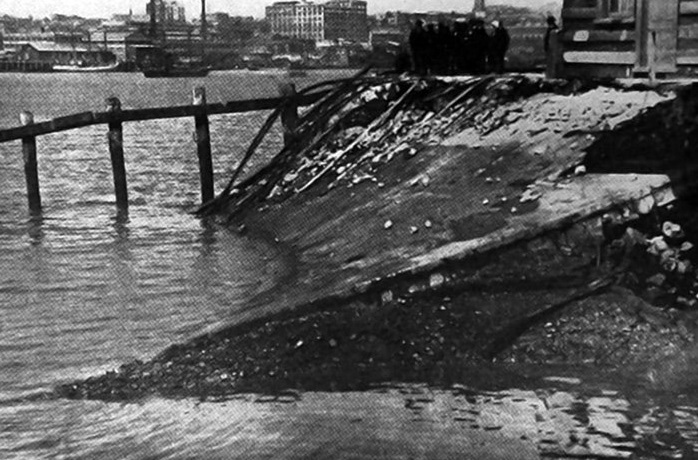

At the point where the wharf had sagged most of the reinforced concrete piles had almost disappeared in the mud and the side wall of large boulders cemented together had fallen to pieces. Seven piles on the other side snapped as if made of chalk. An engineer explained that the disaster was due to the stone wall, built to support the wharf, collapsing and carrying away some piles, thus throwing an extra strain on the others, which gave way. The area that subsided is about 100 feet long, but about 300ft will have to be rebuilt at a cost of about £20,000. The part that collapsed was built in 1921. The whole wharf is 1000 ft long and cost £95,000.
Not tonight, says columnist
Hallowed, did I say? Yes, but this nicht will not be Hallowe'en, however much we may pretend. No doubt it will, as advertised, be a "night of revelry and fun" at the Burns Hall; but, as a stickler for the exact date, I regret that my brither Scots in the Edinburgh of the South find it inconvenient to celebrate the time-honoured festival on October 31. To me the loose variation tends to spoil the business. You might as well have your Christmas dinner in the middle of December.
— by ‘Wayfarer’
Tragic scene at hotel
An inquest was held at the Courthouse yesterday, concerning the finding of the body of an unnamed male child of a young housemaid employed at the Grand Hotel. As a result of the evidence given a warrant was issued and the mother was charged with murder. Dr Evans deposed that at 2pm on October 16, in response to a telephone message, he proceeded to the Grand Hotel and there saw a female patient in a bedroom. He indicated her as sitting in the body of the court. She was suffering from shock following profuse uterus haemorrhage. He could see that the patient had recently been delivered of a child. He ordered her removal to the Hospital. The police showed witness the body of a male child, which witness considered a fulltime child. The face was covered with a piece of clothing tightly constricting the neck. Mr Hanlon pointed out that the accused was obviously not in a fit state of health to be kept in custody. The Chief Detective said that no good purpose would be served in keeping the accused in custody, as she would not get the proper attention in prison. The Magistrate agreed that under the circumstances no surety would be demanded. The girl would have to remain under the control of the female probation officer.
— ODT, 29.10.1924 (Compiled by Peter Dowden)











